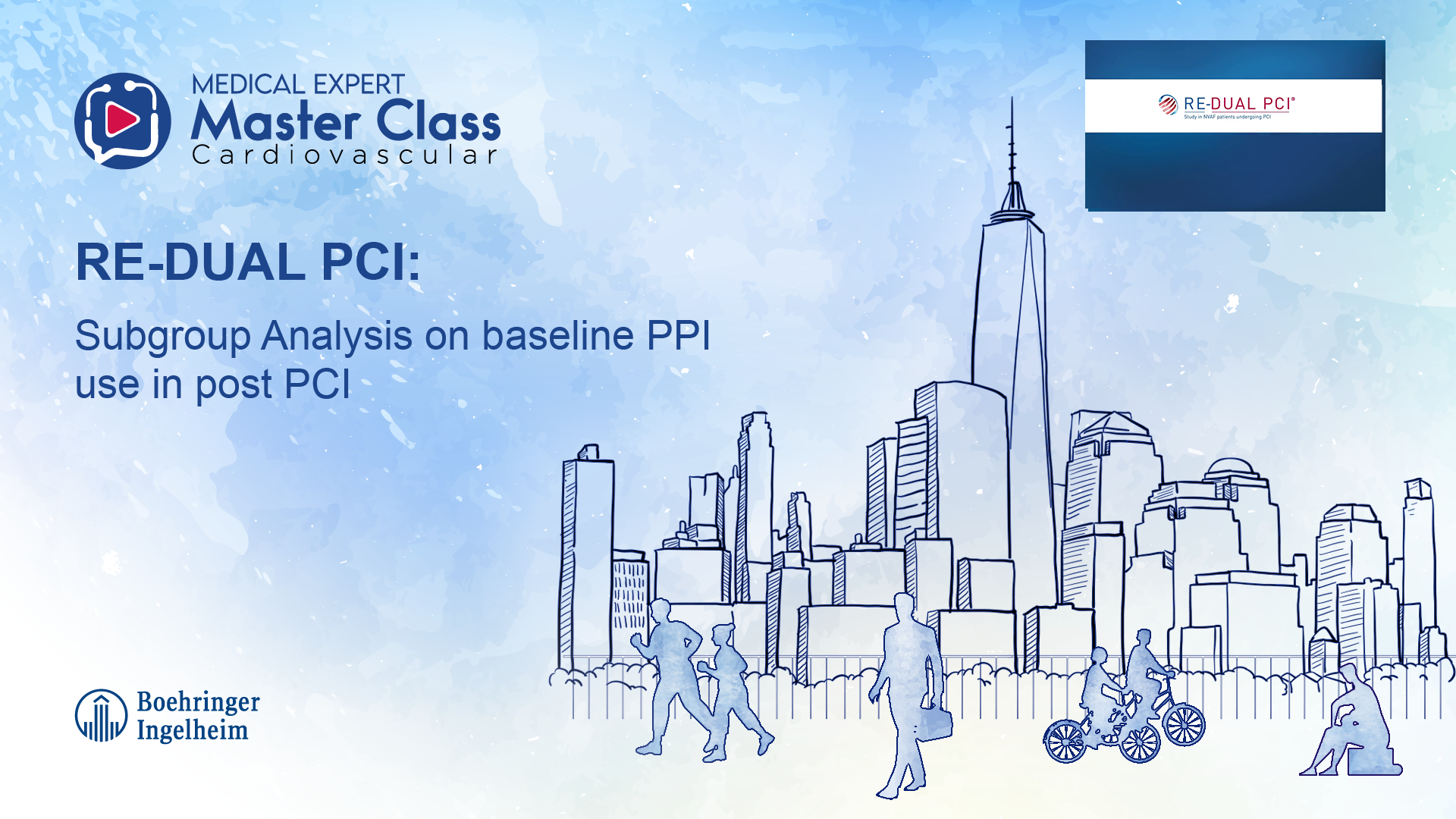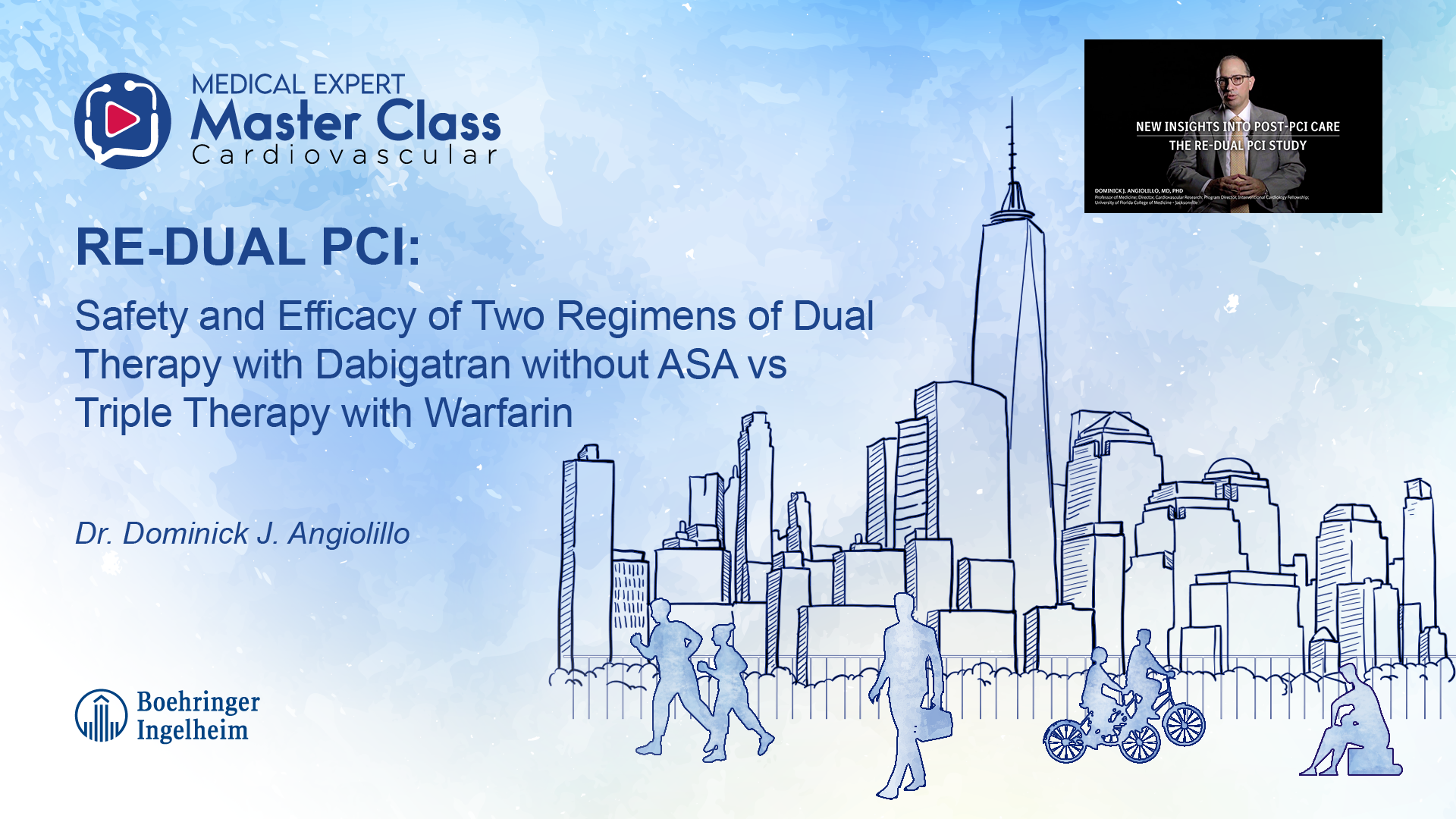- Home
- Clinical Data - SPAF
Use of anticoagulation for stroke prevention is associated with high risk of bleeding in elderly. Dr. John W. Eikelboom provides insights from the RE-LY sub analyses which assessed patients with moderate renal impairment for the risk of ICH and stroke or systemic embolism when treated with both doses of dabigatran versus warfarin. RE-LY analyses showed decline in renal function over time in patients receiving warfarin or dabigatran indicating that renal function does not decide the choice of anticoagulation.
Use of anticoagulation for stroke prevention is associated with high risk of bleeding in elderly. Dr. John W. Eikelboom provides insights from the RE-LY sub analyses which assessed patients with moderate renal impairment for the risk of ICH and stroke or systemic embolism when treated with both doses of dabigatran versus warfarin. RE-LY analyses showed decline in renal function over time in patients receiving warfarin or dabigatran indicating that renal function does not decide the choice of anticoagulation.
AF patients undergoing PCI already on oral anticoagulant (OAC) therapy may need to switch to a different OAC for a variety of reasons. Switching OAC therapies can result in increased risk of bleeding and thromboembolic complications particularly in post PCI setting. The results from RE-DUAL PCI sub-group analysis prove otherwise. The RE-DUAL PCI sub-group analysis reassures safe switch to both doses of dabigatran in post PCI setting irrespective of prior OAC or warfarin use.
The RE-CIRCUIT trial provides insights on the safety profile of uninterrupted dabigatran compared to uninterrupted warfarin in nonvalvular atrial fibrillation (NVAF) patients undergoing catheter ablation.
Dr. Marc Brouwer takes on the clinical data of uninterrupted dabigatran versus warfarin in periprocedural AF ablation from the RE-CIRCUIT trial and goes on to compare with the results from VENTURE-AF, AXAFA-AFNET 5 trial using other NOACs. He also shares the current guidance for the management of bleeding and cardiac tamponade from anticoagulation therapy.
Use of PPI to reduce the risk of bleeding can affect the absorption of other drugs post PCI in patients with atrial fibrillation. The RE-DUAL PCI sub-analysis provides insights of the impact of baseline PPI on safety endpoints when tested with both the doses of dabigatran versus triple therapy.
Dr. Dominick Angiolillo opines that AF patients undergoing PCI need protection from stroke. He shares the results of RE-DUAL PCI trial comparing dabigatran dual therapy versus warfarin triple therapy, to help physicians make better informed choices and minimize the risk of bleeding and mortality.
This Q&A deals with setting new standards for patients with AF - AC 2019 Barcelona with the panel Dr. Marc Brouwer, Dr. Elaine Hylek, Dr. Georg Nickenig and Dr. Todd Villnes along with hosts Dr. John Eikelboom and Dr. Harry Buller.
Anticoagulation in atrial fibrillation have come a long way as Dr. Georg Nickenig shares treatment options for patients undergoing and post-PCI. The 2018 ESC expert consensus recommends discharging patients on triple therapy or dual therapy on concerns of thromboembolic events or bleeding risks respectively. Here, Dr. Georg Nickenig shares imperative evidences from recent studies that show a shift towards dual therapy post PCI/post ACS in patients with NVAF.
This Q&A with Dr. Christopher P. Cannon discusses relevant implications of the RE-DUAL PCI study results in considering dual therapy with dabigatran and triple therapy with warfarin in managing AF patients post PCI.
Dr. Cannon CP shares the results from RE-DUAL PCI that compared dual therapy with dabigatran versus triple therapy with warfarin. Evaluation of primary and secondary end points yielded vital data on safety and efficacy outcomes with these anticoagulants. Dual therapy with dabigatran was found to be as effective as triple therapy with warfarin in managing overall thromboembolic events.
Triple antithrombotic therapy with warfarin is the standard of care in AF patients undergoing PCI, but this is associated with a high risk of bleeding. RE-DUAL PCI study compared trial triple therapy with warfarin and dual therapy with dabigatran post-PCI in patients with AF. Some important differences observed in primary and secondary end points have been shown here.
















